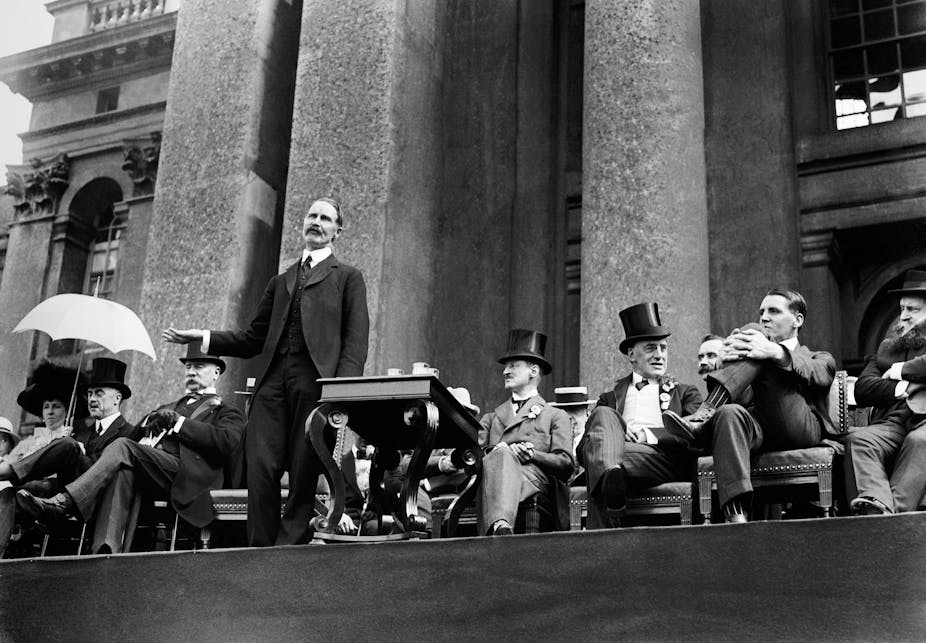At a time when the British Conservative Party has spent over two decades feuding over trade policy and its leadership was recently ruled to have acted unconstitutionally, it’s worth remembering that the 2010s are not unique in the party’s history. As my ongoing PhD research examines, in the early 1900s the Conservatives were caught up in bitter partisan divides over tariffs, regional nationalism, and welfare policy.
From 1886 until the early 20th century, the Conservative Party dominated British politics. Aided by a breakaway grouping of Liberals – who were the Conservatives’ main electoral rivals until the first world war (WWI) – it successfully capitalised on opposition to Irish home rule, the movement for self-government in Ireland. Appeals to empire and to preserving the union with Ireland contributed to series of electoral victories in 1886, 1895, and 1900.
As the century turned, the political debate shifted and there was a growing interest in social reform. There were also increasing Conservative fears about the survival of the British Empire, control over which many in the party believed was necessary to maintain Britain’s place as a first-rank global power.
To address this problem, in 1903 the ex-Liberal Joseph Chamberlain proposed the introduction of tariffs. This was a very radical measure – since the repeal of the Corn Laws in the late 1840s, Britain had been a free trade nation, and free trade had become ingrained in the national psyche.
The battle over tariffs

Tariffs offered many attractions to Conservatives. By introducing its own tariffs, Britain could negotiate preferential trading arrangements with its colonies and dominions. This would in turn strengthen imperial ties and consolidate British power.
Additionally, the revenue from tariffs could finance social reform without increasing the tax burden on the wealthy. Advocates of tariff reform also believed that protecting British industry from “unfair” foreign competition not only aided British manufacturers, but protected the livelihoods of their workers. It was a major policy shift intended to cement traditional ties while maintaining the British social system.
Unfortunately, while many Conservatives embraced protection, the electorate did not. Free trade was an article of faith for many British voters until the Great Depression of the 1930s, and fears about imposing taxes on imported food alienated many working-class voters. Since British exporters were still globally competitive, even many businessmen remained free traders. The Conservatives were thrashed at the 1906 general election by the pro-free trade Liberals. They were reduced to just 157 commons seats out of 670, the worst Conservative defeat in the 20th century.
Having lost government, the Conservatives turned obstructionist in opposition. Advocates of tariff reform consolidated their grip on the party, and increasingly pushed aside free traders. Against convention, the Conservatives used their majority in the House of Lords to block the Liberal Chancellor David Lloyd George’s redistributive 1909 “People’s Budget”. Financing social reform by taxing the wealthy, and without tariffs, was a step too far for many Conservatives in the Lords. After two general election defeats in January and December 1910, the Conservative lords surrendered their legislative veto under threat of being swamped by newly-created Liberal peers.
Irish home rule
An even more dramatic crisis loomed. After losing their majority in 1910, the Liberals relied on the support of Irish nationalists, the Irish Parliamentary Party – who controlled more than 80 seats – to govern. The nationalist price was home rule. The Liberals acquiesced and introduced a home rule bill for Ireland, which would have would have created an autonomous Irish parliament in Dublin. Key matters such as foreign affairs and defence were to be reserved for Westminster, and the number of Irish seats in the House of Commons was to be reduced.

The Conservatives, however, continued to fiercely oppose home rule. Of particular concern was the northern province of Ulster. While Ireland overall was largely Catholic, parts of Ulster had Protestant majorities and wanted nothing to do with home rule. In 1912 the new Conservative leader, Andrew Bonar Law, infamously declared: “I can imagine no length of resistance to which Ulster can go in which I should not be prepared to support them.” While it’s arguable whether he actually would have backed armed insurrection against home rule, that he even hinted he would was extraordinary.
By 1914, the Conservatives had recovered some lost ground after the 1906 electoral disaster, but structural problems complicated any return to power. The Liberal-Labour alliance, under which the Liberals and the newly-created Labour Party generally avoided running candidates against each other, prevented the split in the centre-left vote that has bedevilled anti-Conservative forces since 1918.
Fortunately for the Conservatives, WWI transformed their fortunes. Irish home rule was suspended until after the war. The Conservatives returned to government as part of a wartime coalition in 1915. The Liberals then tore themselves apart as the strains of war took their toll.
Labour then seized the opportunity to displace them as the dominant centre-left party. After WWI ended in 1918, the Liberals withered, and the Conservatives picked up significant portions of the former Liberal vote during the interwar period.
One should never overstate the parallels between the past and present, but the Edwardian era in the early 20th century offers several key lessons for the modern Conservative Party. Despite its popular reputation for pragmatism, the Conservative Party today has ideological fixations that sometimes compromise its unity and electoral success. In the right circumstances, some Conservatives will even cast aside constitutional norms in pursuit of a major policy goal. Brexit is just the most recent example of this. If the party fails to secure a majority on December 12, it may regret uniting so many enemies against it. A split opposition will not always save the day.

